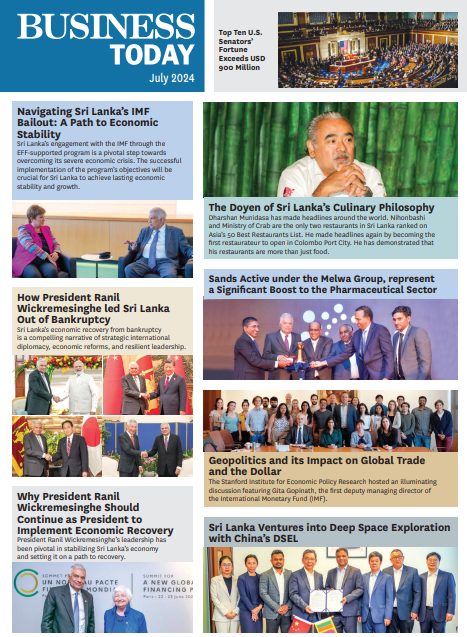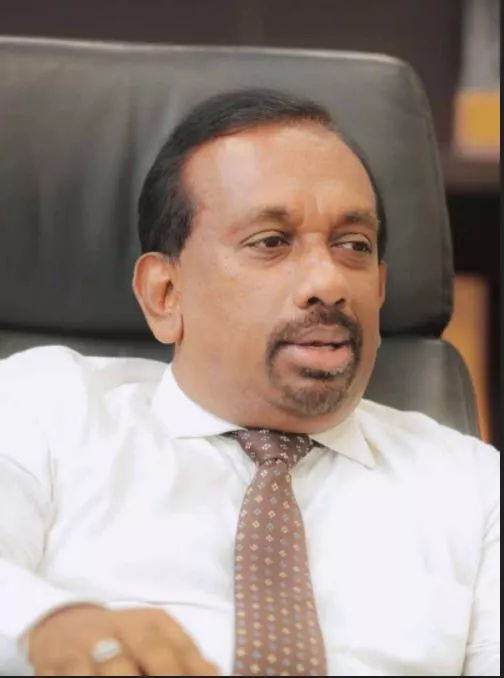
By Udeshi Amarasinghe.
Photography Menaka Aravinda.
In this Government, you are in charge of a critical ministry as the minister of agriculture. Can you tell us about the progress made so far?
During the last few years, we have been highly dependent on imports. The situation was such that the Government also imported even the agricultural produce we could cultivate in Sri Lanka. We have spent about 250 billion rupees per year on imports. Our Government policy is that we want to stop all imports and grow our requirements.
We are currently spending USD one million per day to import milk, which we can produce in Sri Lanka. We also import the entire requirement of dry chili. In the 1970s, we were cultivating chili in Sri Lanka. It is the same scenario with onions, potatoes, and other such agricultural products. Therefore, our Government policy is to grow agricultural produce in Sri Lanka. We received a large allocation from the Budget to develop agriculture. We are focusing on curtailing the importation of agricultural goods, seeds, and milk powder. If we take chili seeds, for example, we can produce these seeds in Sri Lanka. But we are spending two billion rupees to import seeds. Therefore, our plan for the next four years is to curtail the importation of agricultural food items that we can produce in Sri Lanka. We would not be able to stop importing all food items, but whatever we can, we will focus on cultivating those in Sri Lanka. We want to curtail 85 percent of agricultural imports.
We have developed a comprehensive plan. This year, we are planning to stop up to 35 percent of the importation of chili. We have already established seed villages. We currently have three seed villages; one in Kandy for chili, one in Dambulla for onions, and one in Nuwara Eliya for potatoes. In this manner, we have started the production of seeds because that is our first requirement. Then, we have identified land for cultivation, especially in the North and the East. We need 5,000 ha of chili and 14,000 ha for potatoes. Therefore, we have identified the required land and the beneficiary farmers. Seventy percent of the population in Sri Lanka are directly or indirectly involved in agriculture. The biggest problem that we are facing is that we do not have a national policy. In this country, we have nine Provincial Councils where they follow their procedures in agriculture. Then, the Mahaweli Authority does their program, and the Ministry of Agriculture implements another program.
As soon as I was appointed the Minister of Agriculture, the first action we took was developing a national policy on agriculture. We are at the completion stages of the national policy.
The other challenge we face is that it is difficult to plan because we do not have a comprehensive database. We have almost completed the development of the database as well. We will be providing up to 15,000 tabs so that all our agricultural officers will update the data. Therefore, you will obtain all the required information when you enter the farmer’s national ID number. The agriculture officers have targets, and it is their responsibility to update the data and ensure the completion of all activities.
The trend has been that each successive Government would change their agricultural policy. Therefore, when there is a national policy, it does not change according to the Government in power; that is why we focus on developing the national policy. We can work now because the national policy is at the completion stages, and we have the database functioning. We now know where we are in terms of progress. In the future, anyone can see the plan and the progress made, and they can continue from that point.
For the past five years, the entire agriculture sector was stagnant, and we had to reactivate the whole machinery. We have more than 52,000 staff, which is more than sufficient. But, we did not have a plan. Every GS division has an agriculture officer. We have given everyone their responsibilities in writing, and they are now accountable for their actions. In the last month, we cultivated 28,000 acres of paddy in a day. We have 535 Govijana Seva organizations. I instructed that everyone has to start developing ten acres. And, I said before commencing to give all the information to the Deputy Commissioners. They have sent me all the information. I also noted that on the day that the work begins, I require the photographs as well. Therefore, no one can give false figures, and everyone is accountable.
For the first time in history, the Ministry of Agriculture, Mahaweli Authority, and the nine Provincial Councils are all working together. We have a policy and a plan. Therefore, we are all working to achieve the same goal. In the 1970s, agriculture contributed 34 percent to GDP, and today it is seven percent. By 2024, the people will see the difference and the development in the agricultural sector. We will regain the glory and be a significant contributor to the economy.
How practical is it to work with many organizations?
Agriculture is a devolved subject; therefore, we have to work with the Provincial Councils. The Ministry has the funding and the technology, and the Provincial Councils have the required human resources and access to the farming community. For example, we have developed advanced technology in the agricultural sector, but this has not reached the farmer. Why? It is the responsibility of the Provincial Council to disperse the technology. The technology has remained in the laboratories and has not reached the farmers because the Ministry cannot directly access the farmers. Currently, what we do is that we meet every three months and we plan our activities. It is very effective and convenient when we all work together.
The Government’s decision to focus on import substitution in agriculture, was it a response to the global pandemic, or was it a long-term strategy?
Developing the agricultural sector to produce our country’s requirements is a long-term policy decision of the Government. It is not as a response to the global pandemic or the pressure on the US Dollar. If we can cultivate these food items, why should we import them? Agriculture has also become a good source of income and business. We have many large companies approaching us for land and inquiring on whether there are any opportunities.
There is a massive demand for mangoes, bananas, pineapples, and Ceylon Cinnamon for export purposes. Therefore, the increased focus on cultivation is to fulfill the local requirement and cater to the export market. We are planning to supply for export as well. The President aims to curtail imports and increase exports in the agricultural sector.
This year, our paddy cultivation reached 764,000 ha, and we produced 3.2 million metric tons of paddy. In the ‘Yala’ season, we hope to cultivate another 1.8 million metric tons of paddy. Therefore, in total, for the year 2021, we want to produce five metric tons of paddy. It is equal to three million metric tons of rice. The country’s requirement is only 2.4 million metric tons. Therefore, we have 0.6 million metric tons of rice in excess in 2021, which we can export. Even chili we may be able to ship this year. Many private companies are also interested in agriculture, which could be a result of the COVID-19 pandemic. Agriculture has become a good investment, and there are significant returns as well.
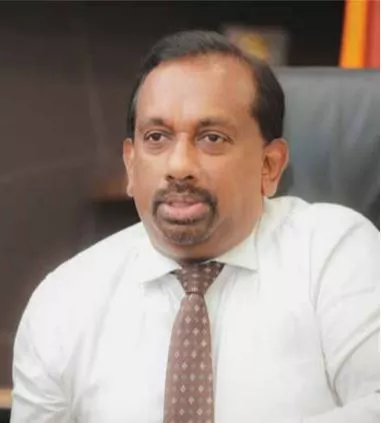
How are you supporting those who are engaged in agriculture?
We are providing 100 percent duty-free for businesses in the agriculture sector. For example, the importation of machinery is duty-free. Furthermore, if a person is investing in agriculture, we provide loans at the rate of four percent interest and provide land from the Government. The Mahaweli Authority has advertised the availability of 20,000 ha of land for agricultural purposes. Furthermore, through the JDB, we have provided land for agriculture.
We are planning to implement an agriculture land bank. There is sufficient land in Sri Lanka for agriculture. The LRC, JDB, SPC, and all the plantation companies, and the Mahaweli Authority all have land. We want to distribute the land from one focal point. We can give businesses the land, provide them with low-interest bank loans, technology, and provide them with the export market.
We are helping individual farmers in many ways. We have our modernization projects. For example, we are looking at stopping the importation of chili; to do that, we need to cultivate 5,000 ha. We give each farmer; if he is growing chili on one acre, we give him 350,000 rupees for one acre. We also provide them with the drip irrigation system, the fence, and the seeds. We provide for private land as well. This program is currently in place in Anuradhapura.
We have 500 acres from Mullativu, 500 acres from Jaffna, 500 acres from Vavuniya, and another 500 acres from Batticaloa. That is 2,000 acres in total. We are hoping to work with former LTTE cadres. I have requested the GA to select the beneficiaries. We will be giving them all necessary items to cultivate, and we are giving them a buyback guarantee.
Even at the Cabinet meeting, I have informed the President that we have to focus on the North and East if we want to do agriculture. There’s plenty of lands, and the soil is fertile, and it is effortless to work with the people. In Batticaloa, farmers are cultivating chili in 1,200 acres in one village. Every single farmer is growing chili without any support from the Government. The Government needs to have a policy; we should provide the farmers with the technology and guide them on the right path.
We are producing seeds as well. To create the quantity, we give the farmer a grant of two million rupees. We provide them with a tunnel with modern technology, and it is 2,000 sqft, and they can each produce 30kg of seeds within tunnels in Dambulla and Nawalapitiya. Many said that it is an impossible task, but I took the challenge and first started the project in Nawalapitiya. I now have 100,000 sqft of tunnels in Nawalapitiya, and we will produce 1,200kg of seeds for the first time. In this manner, we assist the farmer.
The Agrarian Bank comes under the purview of the Ministry of Agriculture through the Govijana Seva. We use to give only 50,000 rupees, which I have increased to 500,000 rupees. Any farmer can obtain the loan; therefore, they do not need to get money from any third party. We have initiated this process as well.
The most important way we support the farmer is by providing them with the right price and the best seeds. We are also looking at removing the middle man so that the farmer and consumer get the right price. We have economic centers. The reason why the Government established the economic centers is to provide the right price to the farmers.
It has become a supermarket; what has happened is that the farmers have rented out their shops. I will be opening economic centers in Vavuniya, Batticaloa, and Jaffna. We will be giving ten shops each to the farmer associations. If we provide the farmers with the seeds, technology, the market, and the right price, they will do well.
How effective is the implementation of new technology in the agriculture sector?
The Government has the technology, and we have spent millions to develop the required technology. For instance, in Bathalegoda, we have the paddy technology farm. I do not believe that any other country has such innovation in this sector. Unfortunately, the technology isn’t going to the farmers. We have started that process. We have officers known as AIs. We have taught them the technology, and it is their responsibility to take the technology to the villages. We have one AI for a particular AG division. But, we need at least five AIs for one AG division. We are advertising, and we will recruit more, and we will provide them with the training. In another year’s time, we can transfer the entire technology to the farmers.
If you take the seeds program, it is providing the technology to the farmers. Previously we had an issue with the water supply, but today, we give the drip irrigation system to all the farmers. I have allocated two billion rupees for the provision of drip irrigation systems.
We have a system to monitor that all the facilities we provide reach the farmer. We have our Director-General, then we have district-wise Deputy Commissioners, and we have officers in the AG and GS divisions. The Provincial Councils are syncing with us well.
How do you break the mafia?
The biggest mafia is in agriculture. There are five groups; seeds, rice, paddy, vegetable, and fertilizer. During the tenure of the last Government, they had imported low-quality fertilizer. The Auditor General’s report mentions this. As soon as I became the Minister of Agriculture, we changed the specifications of the fertilizer. Therefore, none in the mafia could come into the tender. They could not supply to our specifications.
We were able to break the first mafia, which is in rice. The mill owners earn about 50 million rupees from each cultivation season. Our fixed price is 50 rupees; whatever the farmer’s paddy, they buy 80-90 percent at the rate of 50 rupees. They buy ten percent at the rate of 70 rupees. They tell the Government that they purchased it at 70 rupees and want to sell it at 120 rupees. I informed the Cabinet that we need to have a buffer stock of at least 300,000 metric tons. I received approval to proceed, and the Cabinet allocated 26 billion rupees for this purpose.
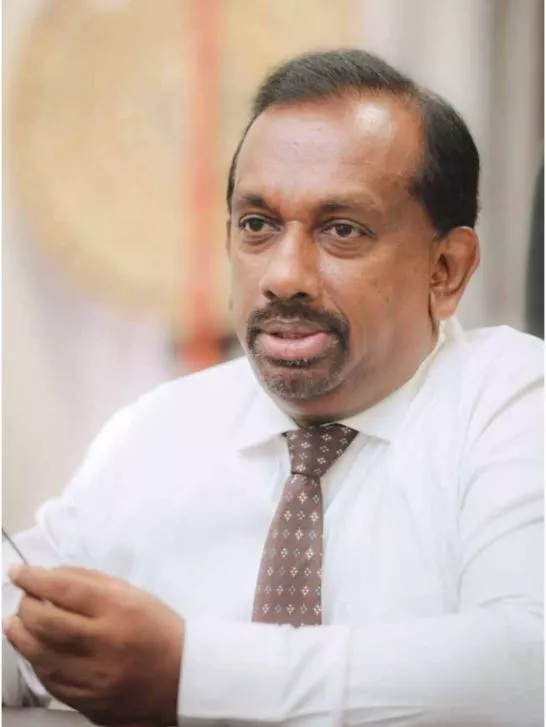
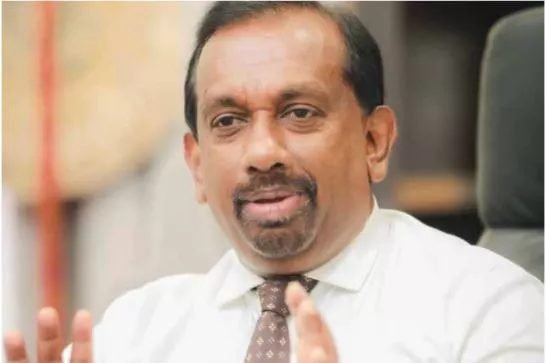
Our price is 50 rupees, I went to the market, and the seller increased it to 59 rupees. I spoke to the Cabinet, and they said to be competitive. Therefore I raised the price to 56.50 rupees, and we were able to purchase paddy. We currently have 62,000 metric tons of paddy. From April 1st onwards, I distributed the paddy to 2,500 cooperatives, 416 CWE outlets, Food City, Keells, and Laugfs. From April 1st, we are selling naadu rice for 96 rupees and red and white kekulu rice for 92 rupees. If we had not taken this action, the prices would have increased rapidly. One person controls paddy, egg by another, maize by two people, and chicken by four people.
The Government needs to take control. The reason why the President appointed me to this Ministry is to break the mafia. And, I will do so. I have been able to break the rice mafia, and I will break the rest as well.
What is the status of the dairy sector?
We are currently producing only 40 percent of our milk requirement. We have 1.5 million cattle, but only 250,000 can produce milk, and their average production per animal per day is two liters. If you can provide adequate water and food, we can increase the quantity to five liters. We have advertised for mega-farms through the BOI, inviting investors. Currently, we are looking at two projects where we will bring 15,000 animals to the country. We will initiate the first project in Nawalapitiya, where we have the best estate known as Galaboda. It has the best water. Initially, the investor will bring 5,000 animals from the Netherlands, and it will take three years to complete the farm. It will have 100 percent modern technology, and even the animals will be kept in air-conditioned facilities. We are also looking at providing treatment to 500,000 cattle currently in the country who cannot conceive. Through this project, we will increase the number of milk-producing cows to 750,000.
We are the largest importer of milk powder; thus, we are looking at producing our milk requirement within Sri Lanka. We can achieve this because we have good farms. I am looking at signing an agreement with all the milk collectors, where we will implement a flat rate of 80 rupees per liter. Similar to rice, the milk farmers too will have a guaranteed price.
You have been in politics for 30 years. you gave forgiveness to people who had done wrong to you in the past few years, which is a first by any politician. What can you tell us about this?
During the last five years, I suffered greatly. I was a target because I always questioned the Government’s actions as a member of the Opposition. When we lost in 2015, President Mahinda Rajapaksa returned to Medamulana in Hambantota. Six of us went to Hambantota and spoke to him. He said he would not come back, but I disagreed and said that he had to come back. After that, we started the campaign. At the first Hyde Park rally, I was the chairman. I was the chairman of the Kandy to Colombo walk and the chairman of the Nugegoda meeting.
Even personally, they harassed my family and me. My son was studying in the UK, the CID questioned him as well. They put me in jail. At that time, my son and daughter did not feel comfortable going to school. I know the difficulty and the mental stress. Therefore, I cannot agree with incarcerating a person for political reasons. We should stop this culture, and I thought I should start the process.
Who is mahindananda aluthgamage?
I am always 100 percent with my leader. When I entered politics, I gave my full support to Madam Chandrika Bandaranaike Kumaratunga, after that to President Mahinda Rajapaksa, and now, I am 100 percent with President Gotabaya Rajapaksa. I never go behind other people or have any different agendas. I am always with one leader.
I always work. I am a workaholic; if you visit Nawalapitiya, my electorate, you will see that I have transformed Nawalapitiya. I was the Chairman of the Kandy District City Development Committee. I did much development work such as making the roads four-lanes and constructing the new bus stand.
Therefore, people know me as a person who works, and they know they can meet me anytime. I have three public days a week, and I meet at least 5,000 people during that time. I meet at least 1,000-1,500 a day, and I speak with people till late at night. Not many can do this, but I can. As a politician, the people know that they can meet me, speak to me and they know I will help them. I have that credibility.
I visit all the areas so even my officials know that they cannot mislead me. I always keep notes, and I check on the progress. At least two days of the week, I visit the districts. I am always with the farmers; I see them and inquire about their progress and requirements. Now everyone knows that I visit the field, in agriculture that is a must. You need to adopt a hands-on approach. I enjoy this sector immensely. The President also has the confidence that I will deliver on the targets that we have set.
My father was a Member of Parliament from 1970 to 1977. He was a very laid-back person, not like me. I am very direct in my approach. I will always say what I believe is right even to the President and the Cabinet. The President is a good listener, and he always makes the right decision. I have always been the same during my over 30-year career in politics. Most of the time, being direct has backfired on me, but I will always say what I believe is right. It is good to be so because I can live with my conscience.
I read a lot, and I am always prepared. I will always attend a television debate or speak in Parliament if I have prepared myself with the relevant details. I have a comprehensive library where I have all the information I require. My work is my passion.
My main objective in these five years ahead of us, is to meet our national goals and bring agriculture back to the forefront of our country through our various programs. I will also show the full capacity of how efficiently we can work if we all work together towards one goal without any personal agenda, which may hinder any progress.
The previous Government made various claims against me, which were baseless and driven by political revenge. I will set an example against this culture. In these five years I will work and prove myself to the people through my work. I will continue to perform at my fullest capacity to serve our nation.



